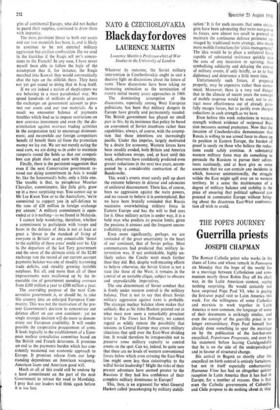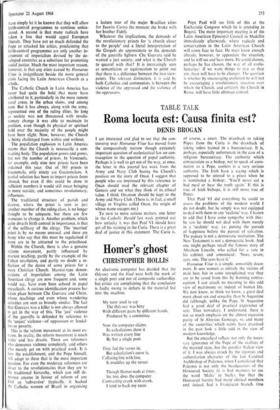Guerrilla priests
THE POPE'S JOURNEY JOSEPH CHAPMAN
The Roman Catholic priest who works in the slums of Lima and whose remark in Panorama on Monday that the hope of the world lies in a marriage between Catholicism and com- munism nearly threw Robin Day off his chair was, in the Latin American context, saying nothing surprising. He would certainly not have surprised Pope Paul VI, who is paying the first-ever papal visit to Latin America this week. For the willingness of some Catholics and marxists to work together in Latin America is now common, the language of some of their documents is strikingly similar, and even the concept of the guerrilla priest is no longer extraordinary. Pope Paul himself has already done something to spur the marriage on by the publication of the last-but-one encyclical, Populorum Progressio, and even by his statement before leaving Castelgandolfo that he is on the side of the underprivileged and in favour of structural change.
His arrival in Bogota so shortly after the encyclical on birth control is entirely fortuitous, but not in itself especially embarrassing. Humanae Vitae has had an altogether quieter reception in Latin America than it has bad in Europe, for a number of reasons. One is that even the Catholic governments of Colombia and Chile propose to do nothing about it; they
have simply let it be known that they will allow birth-control programmes to continue unhin-
dered. A second is that many radicals have
taken a line that would appal European liberals. They have not so much defended the
Pope as attacked his critics, proclaiming that birth-control programmes are only another in- strument of imperialism devised by the de- veloped countries as a substitute for promoting social justice. Much the most important reason, however, is that any crisis caused by Humanae Vitae is insignificant beside the more general crisis facing the Latin American Church as a whole.
The Catholic Church in Latin America has never had quite the hold that many have attributed to it, particularly in the more remote rural areas, in the urban slums. and among men. But it has always, along with the army, represented one of the ruling elites. So long as society was not threatened with revolu- tionary change it was able to maintain its position, even though its physical or spiritual hold over the majority of the people might have been slight. Now, however, the Church is being challenged from within and without.
The population explosion in Latin America means that the Church is necessarily a con- tracting body. The population grows and grows, but not the number of priests. In Venezuela, for example, only nine new priests have been ordained this year. Out of 565 priests in Guatemala, only ninety are Guatemalans. A partial solution has been to import priests from abroad, but even if this could be done in sufficient numbers it would still mean bringing in more outside, and sometimes revolutionary, influences.
The traditional structure of parish and diocese, where the priest is seen as just another member of the ruling class, is no longer thought to be adequate, but there are few resources to change it. Another problem, which quite dwarfs birth control in importance, is that of the celibacy of the clergy. The 'married' priest is by no means unusual, and there are many who say that this must be regularised if more are to be attracted to the priesthood.
Within the Church, there is also a genuine reform movement, partly influenced by marxist teaching, partly by the example of the Cuban revolution, and partly no doubt a re- flection of the desire of some priests for a more Christian Church. Marxist-type denun- ciations of imperialism among the Latin American clergy are now frequent and, some would say, have even been echoed in papal encyclicals. A curious identification process has taken place between Che Guevara and Christ, whose teachings and even whose wandering activities are seen as broadly similar. The fact that Guevara was a killer is not always allowed to get in the way of this. The 'just' violence of the guerrilla is defended by reference to the 'unjust' violence—of oppression or feudal- ism or poverty.
This is the reform movement at its most ex- treme. In reality, the reform movement is much wider and less drastic. There are reformers who denounce violence completely, and others who merely get on with practical work. It is how the establishment, and the Pope himself, will adapt to these that is the most important question. For even the moderate reformers are closer to the revolutionaries than they are to the traditional hierarchy, which can still de- nounce anyone in favour of reform of any kind as 'subversive' (typically, it backed the Catholic women of Brazil in organising
a lecture tour of the major Brazilian cities for Juanita Castro the moment she broke with her brother Fidel).
Whatever the implications, the demands of the revolutionary priests for 'a church closer to the people' and a literal interpretation of the Gospels do approximate to the demands of the guerrilla fighters. Che Guevara said he wanted a just society, and what is the Church to quarrel with that? It is increasingly seen as semanticism or equivocation to point out that there is a difference between the two view- points. The relevant distinction, it is said by both Catholics and communists, is between the violence of the oppressed and the violence of the oppressors. Pope Paul will see little of this at the Eucharistic Congress which he is attending in Bogota. The more important meeting is of the Latin American Episcopal Council in Medellin immediately afterwards, where radicals and conservatives in the Latin American Church will come face to face. He must know enough already, however, to appreciate the situation, and he will see and hear more. He could choose, perhaps he has chosen, the way of all evolu- tionaries : if we want things to stay as they are, there will have to be changes. The question is whether by encouraging evolution he will not be encouraging a revolutionary situation over which the Church, and certainly the Church in Rome, will have little ultimate control.



































 Previous page
Previous page